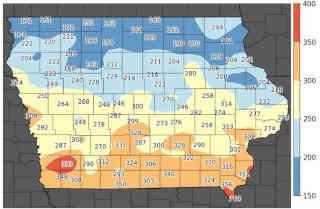By Ashley Dean and Erin Hodgson
Iowa’s most significant soybean insect pest, the soybean aphid, alternates between two hosts to complete its development. The primary host of soybean aphid is buckthorn, an invasive shrub often found in hedgerows and roadside ditches, and its secondary host is soybean. For most of the year, soybean aphids exist as cold-hardy eggs on buckthorn branches near leaf buds. For many aphids that overwinter as an egg, hatching happens when the host resumes spring growth. If eggs hatch too soon, aphids can suffer mortality from starvation because they feed on phloem from actively growing tissue.
We can track soybean aphid development using growing degree days (GDD), and research has shown that eggs hatch around the time buckthorn buds swell. Soybean aphid egg hatch occurs between 147-154 degree days (base 50°F) and buckthorn bud swell happens shortly after that (165-171 degree days). Based on air temperatures in 2023 (Figure 1), egg hatch is complete in northern Iowa, where most of the buckthorn in Iowa is located, and buckthorn bud swell is likely happening now.

Compared to previous years, soybean aphid egg hatch is approximately two weeks ahead this year. The implications for an earlier egg hatch are not known, but we encourage people to scout for colonization on vegetative soybean. After soybean aphid eggs hatch, they have a few asexual generations on buckthorn before leaving in search of soybean. Soybean aphid may colonize soybean plants as early as the beginning of June, but these infestations are typically short-lived due to natural enemy activity and environmental factors. However, infestations are sporadic and change quickly, so scouting throughout the growing season is the best way to understand how populations are changing and whether management is required. Begin scouting soybeans for soybean aphid in June and continue to scout every seven to 10 days. Learn more about soybean aphid identification, biology, scouting, and management in this encyclopedia article.
Source : iastate.edu